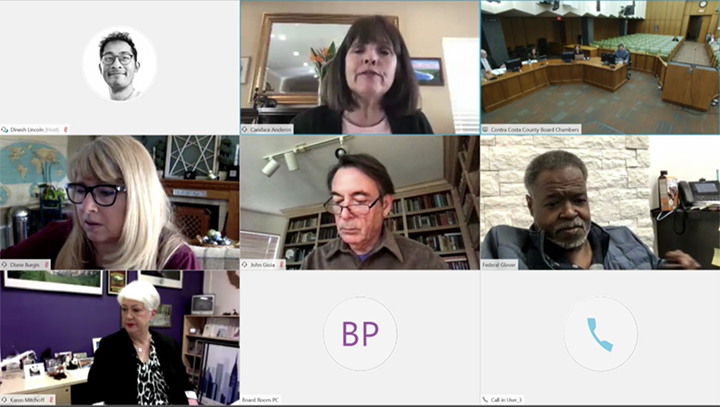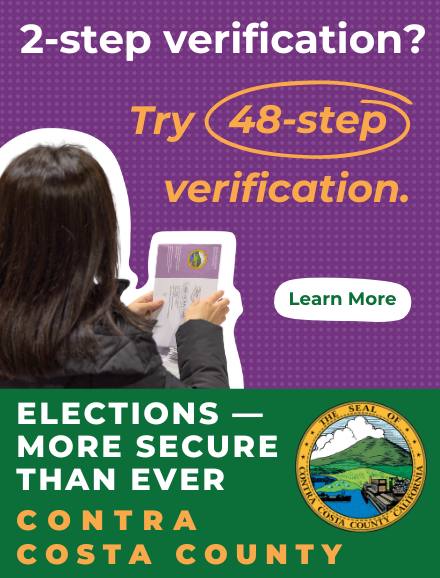Hold online, virtual meeting; homeless population increases 43% in county
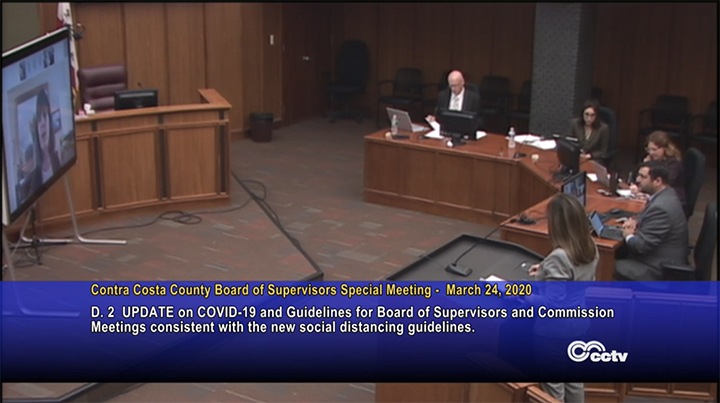
County staff stay six feet apart in the Board meeting room speak with members of the board during the virtual meeting. Video screenshot.
By Daniel Borsuk
Forced to meet remotely in an inaugural teleconference board meeting Tuesday, Contra Costal County Board of Supervisors learned the county is lean on supplies to combat the rising COVID-19 pandemic.
Circumstances are getting so dire, Contra Costa Health Services officials have put out the call for donations from the public for surgical protective equipment and supplies for healthcare providers as concerns emerge the county cannot deliver an adequate amount of medical gear and supplies for emergency workers to be adequately protected while treating those potentially affected by COVID-19.
As of Tuesday, Contra Costa Health Services Director Anna Roth told supervisors 71 county residents now have contracted COVID-19 and one person has died, an increase from 10 COVID-19 cases when Roth released her initial report to the Supervisors 21 days ago on March 3. Twenty-two persons are currently waiting for lab test results, reported Roth.
When Supervisors individually met via teleconference, Contra Costa Health Services along with six other Bay Area medical entities had earlier announced a unified, regional program designed to combat the spread of COVID-19 by ordering laboratories testing for COVID-19 to report comprehensive testing data to local and state authorities.
In addition, the county is stepping up the wide gap in procuring medical supplies and gear for health care workers. “We are making preparations for more people to become sick,” said Dr. Chris Farnitano, Contra Costa County Health Officer.
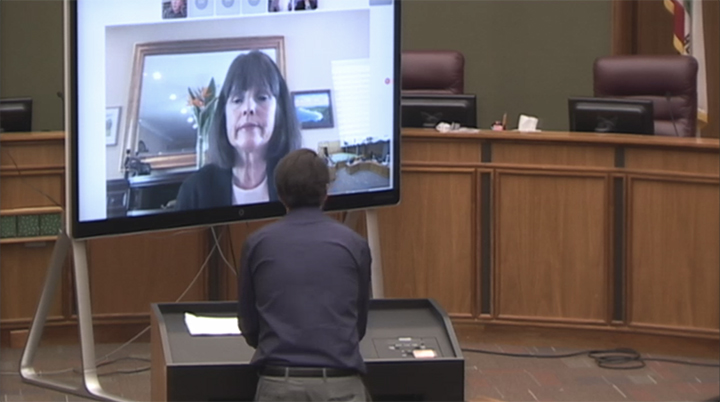
County Health Officer Dr. Chris Farnitano, speaks with Board Chair Candace Andersen during the virtual meeting. Video screenshot.
A call has gone out to the public from Contra Costa Health Services to donate protective medical supplies for health care workers. Those supplies include eye protection including goggles and face shields, antibacterial and disinfecting wipes, typically alcohol or bleach based, excluding baby wipes. The county also needs N-95 and surgical masks in unopened containers, and disposable medical gowns.
The county has designated three donation centers that will be open Monday through Friday, 10 a.m. to 2 p.m. The donation centers are at West County, 151 Linus Pauling Dr., Hercules; Central County, 1750 Oak Park Blvd., Pleasant Hill; and East County, 4545 Delta Fair Blvd., Antioch.
County Administrator David Twa said the County has started to buy motel rooms nearby medical work sites so tired and overworked emergency workers can get sleep and avoid having to travel home during the nationwide health emergency.
“Some people say this COVID-19 pandemic is going to dip into our reserves. Well, we have already seen COVID-19 dip into our reserves,” said Supervisor Karen Mitchoff of Pleasant Hill who was frustrated with the likely fiscal impact as well as the technical problems that flared up during the two-hour supervisors’ teleconference meeting. Mitchoff requested that a better teleconference program replace the current program.
Supervisors are expected to begin their review of the proposed 2020-2021 fiscal year budget via teleconference at next week’s board meeting.
Homeless Population Increases 43 Percent
In other business, Lavonna Martin, director of the Contra Costa County Health, Housing and Homeless Services, informed supervisors that the county’s homeless population in 2019 increased 43 percent in two years. Based on a department survey there were 2,295 homeless persons counted in 2019 in comparison to 1,607 in 2017. In 2018, there were 2,234 homeless persons.
The 2019 report indicates 1,398 persons are in the 25 to 54-year-old age bracket. The survey found that 165 persons were 62 years old or older.
Sixty-three percent of the families that are homeless can be served by available shelters with 201 beds, but only 28 percent of the single adults can be served by shelters, according to the study.
Psychiatric Emergency Service Project
Supervisors gave the go ahead for the Public Health Commission to conduct public hearings on the proposed remodel project for the Contra Costa Regional Medical Center’s over-used Psychiatric Emergency Services – PES – located in the Contra Costa Regional Medical Center in Martinez.
Current conditions at the PES are deemed to be a danger to patients, to the general public.
The objectives of the PES project are to separate children, ages 7 through 12, and adolescents, ages 13 through 17 years, from adult patients, and provide a larger dedicated space more conducive to a therapeutic environment to better support youth and their families, the addition of a confidential triage space at the entrance of the PES, and expansion of treatment space for adults.
Supervisors were shown three project options. Option 1 would cost $3.7 million and add 2,101 square feet to the existing 5,370 square foot facility. Option 2, the recommended option, would cost $4,920,968 and would add 2,265 square feet to the current facility, and Option 3 would cost $8,332.471 to add 3,499 square feet to the existing facility.
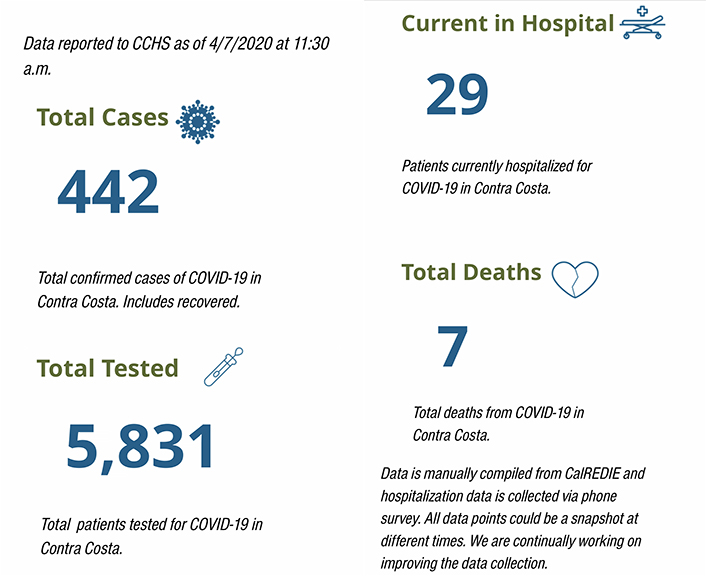









 From Contra Costa Health Services
From Contra Costa Health Services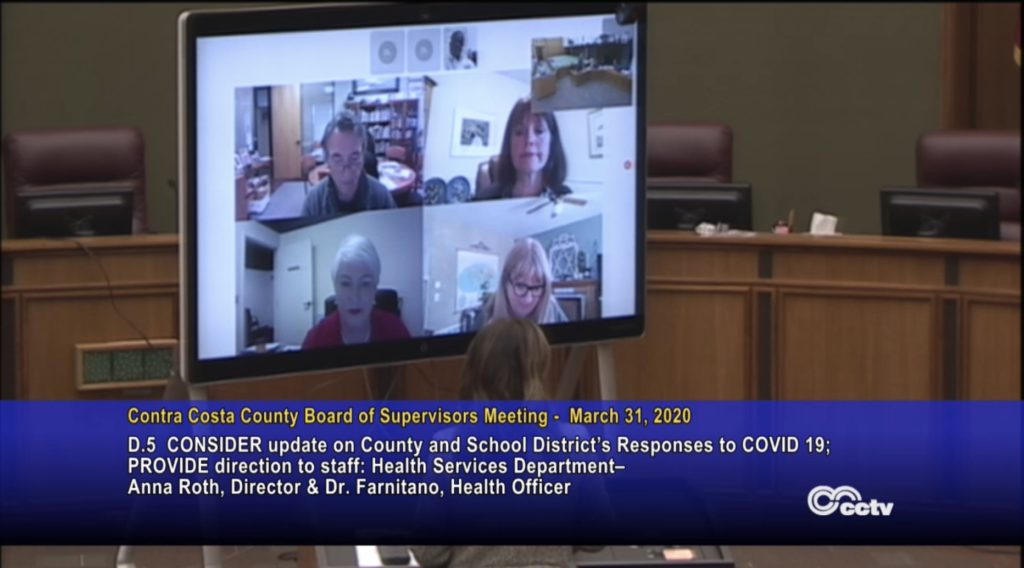

 On Thursday evening, Governor Gavin Newsom announced a statewide shelter-in-place order for all Californians, except certain essential employees and residents acquiring necessities, such as food, prescriptions, and health care.
On Thursday evening, Governor Gavin Newsom announced a statewide shelter-in-place order for all Californians, except certain essential employees and residents acquiring necessities, such as food, prescriptions, and health care.
